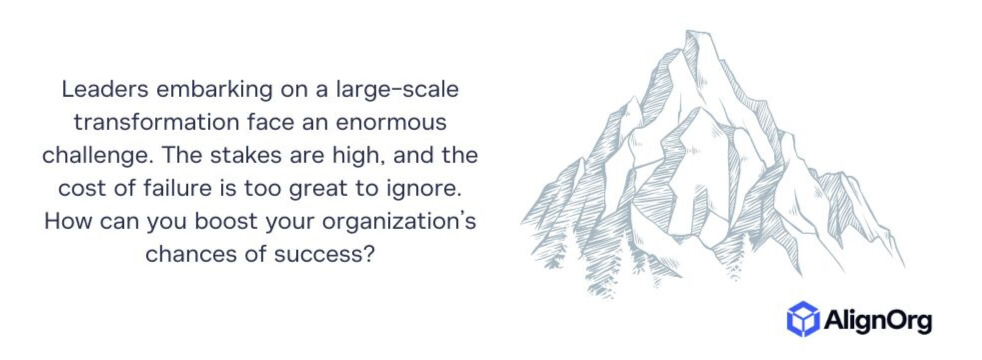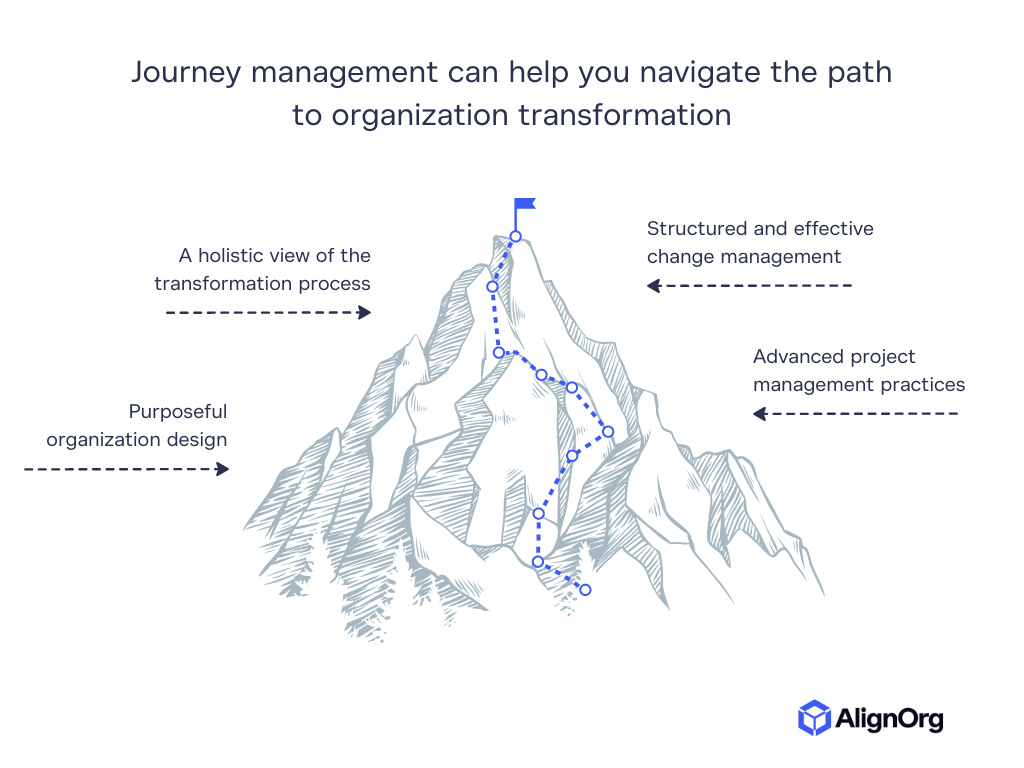Let me start by listing some facts:
- Transformations fail. According to this study, 70% of complex, large-scale change programs don’t reach their stated goals. This high failure rate can lead to wasted resources, missed opportunities, and significant setbacks.
- Transformation initiatives are not just “another project”. Transformation initiatives fundamentally alter the fabric of an organization, requiring a nuanced approach beyond standard project management techniques. Failure to recognize this can result in half-baked efforts that can do more harm than good.
- There are always pros and cons to every organizational design. Whether it’s centralizing functions for efficiency or decentralizing for agility, each decision carries its own set of trade-offs. Poor organizational design choices can stifle innovation, slow down operations, and create internal conflicts.
- Change is individual. Change management must account for individual responses to change. Employees' reactions will vary widely based on their personal experiences and perspectives. Neglecting the human aspect of change can lead to low morale, resistance, and even attrition.
- There will be consequences for failure. Failing to manage change effectively can lead to significant financial losses, lost trust, and a tarnished brand reputation.

I list the above facts not to scare, but to highlight the enormity of the challenge when an organization embarks on a large-scale transformation journey. The stakes are high, and the cost of failure is too great to ignore.
The Need for Journey Management
Several years ago, I was involved in an Agile transformation for a global IT organization with more than 1,200 employees. Senior leadership was executing this transformation based on a business case that promised cost reductions while improving delivery speed and quality. The leadership team committed significant internal and external resources to restructuring, retooling, and retraining the workforce. But after a year of missed milestones and lack of organizational adoption, the transformation was cancelled. Using the lens of journey management and 20/20 hindsight, we can extract a few lessons learned to benefit the next wave of transformation initiatives.

Holistic Approach
A holistic view to the transformation process is required to ensure all aspects of the implementation are considered. Journey management addresses key elements of an organizational transformation such as people movement, work transition, knowledge transfer and technology enablement. While these elements make logical sense when discussing a high-level transformation roadmap, if your team does not have the “been there, done that” experience to help with the practical implementation the nuances required to iterate and integrate real time, lessons learned will be missed.
In the example highlighted above, the core team equated change management to training workshops. This ultimately left the organization feeling that leadership did not understand what actually happened on a day-to-day basis, as there was no acknowledgement or active engagement to transition work activities from a current state to future state. If the transformation was actively engaged in journey management, that feedback would have quickly transitioned into the program with minimal effort.
Structured Change Management
Effective change management is crucial for any transformation to succeed. Journey management includes strategies to manage individual and organizational responses to change, ensuring smoother transitions and higher adoption rates. In the case above, stakeholder assessments did not accurately capture all of the risks and impacts to the change. This left an incomplete picture of the degree of change, and consequently a change plan that that did not help move the organization toward its transformation goals.
Optimal Organization Design
Journey management also supports the notion that organization design needs to be iterated as implementation occurs. While key macro and micro level organizing choices should have already been made at the point implementation is kicking off, core teams who are responsible for strategic transformations must stay in tune with the organization when additional design work is required to support the change. A rigid “top down” approach that does not incorporate the collective feedback of the organization loses the ability to react and adjust the design to fully align with the strategic goals of the transformation.
Enhanced Project Management
By incorporating advanced project management practices, journey management ensures that transformation initiatives are delivered on time, within budget, and with the desired outcomes. This includes risk management, resource allocation, and performance tracking. While most organizations have mature project management capabilities, it is actually the specific experiences leading transformation initiatives that allow the project manager to “look around the corner” and help the core team circumnavigate the unique set of challenges that occur during a large-scale transformation.
Conclusion
In today’s rapidly evolving business environment, large-scale transformations are inevitable. However, the success of these initiatives hinges on a comprehensive and integrated approach. AlignOrg has built Journey Management services to provide the necessary framework and expertise to help our clients navigate the complexities of organizational change, ensuring that transformations not only succeed but also drive long-term value for the organization.
Investing in journey management is not just a smart move; it’s a crucial step towards building a resilient, future-ready organization.





